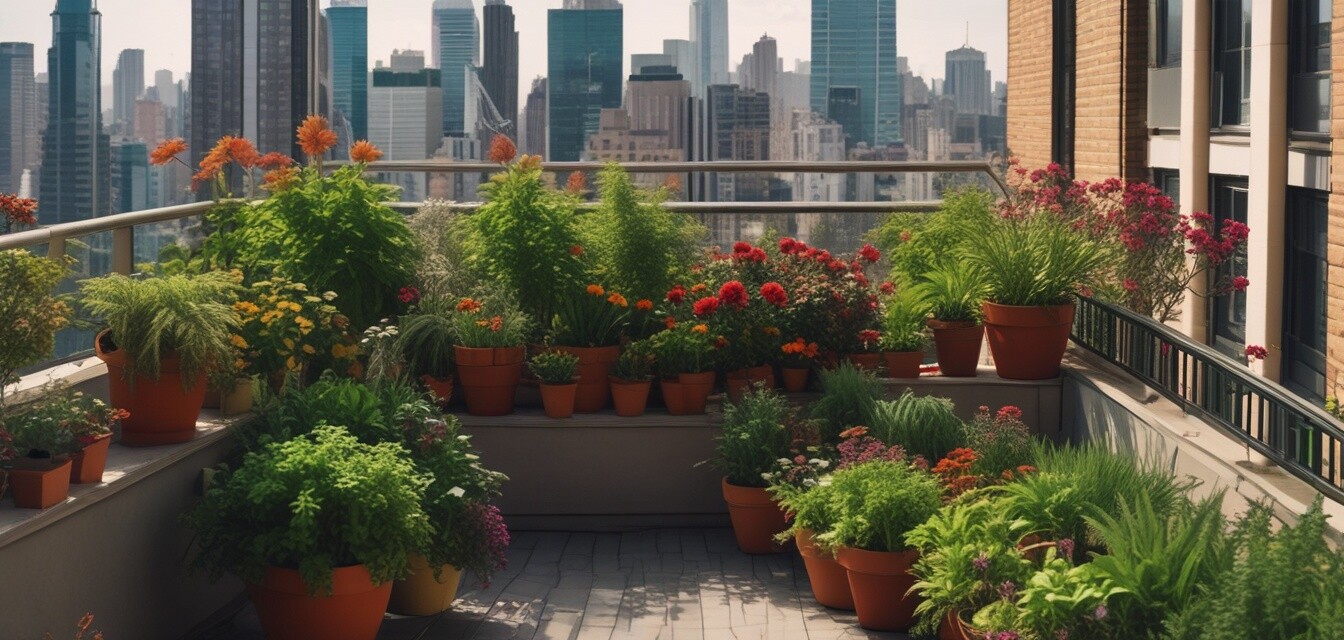
The role of urban gardens in climate resilience
- Urban gardens play a significant role in enhancing climate resilience.
- Implementing sustainable gardening practices can improve air quality in cities.
- Green spaces on balconies foster biodiversity and support local ecosystems.
- Engaging in balcony gardening encourages community participation and awareness.
- Adopting container and vertical gardening techniques maximizes small spaces.
Urban gardens, especially those situated on balconies, are emerging as a powerful solution to combat the challenges posed by climate change. As cities grow and concrete landscapes expand, the need for sustainable living practices becomes more pressing. This article explores how urban gardens contribute to climate resilience and sustainable living, and how they can transform balcony spaces into thriving green oases.
Understanding climate resilience
Climate resilience refers to the ability of a community, city, or system to anticipate, prepare for, and respond to adverse climate events. Urban gardens, particularly balcony gardens, can effectively enhance this resilience by providing numerous ecological, social, and economic benefits. Here are some key ways urban gardens contribute to a more resilient urban environment:
1. Mitigating urban heat islands
Urban areas often experience higher temperatures than their rural counterparts due to the urban heat island effect. This phenomenon can exacerbate the impact of heatwaves, leading to health issues and increased energy costs. Urban gardens help combat this by:
- Providing shade and cooling through plant transpiration.
- Reducing the need for air conditioning, leading to lower energy consumption.
2. Improving air quality
Plants are natural air purifiers. By absorbing carbon dioxide and releasing oxygen, urban gardens can help improve the overall air quality. Some specific benefits include:
- Absorbing harmful pollutants, including nitrogen dioxide and particulate matter.
- Creating an environment that supports healthier living conditions.
3. Supporting biodiversity
Urban gardens offer habitats for various species, becoming essential corridors for wildlife in densely populated areas. Increasing biodiversity can:
- Enhance pollination for local plants.
- Promote a balanced ecosystem that helps control pests.
Incorporating sustainable gardening practices
To maximize the benefits of urban gardens, incorporating sustainable gardening practices is crucial. Here are some practices that can be easily implemented in balcony gardens:
| Practice | Description | Benefits |
|---|---|---|
| Composting | Using kitchen scraps and organic waste to create nutrient-rich soil. | Reduces waste and provides plants with essential nutrients. |
| Water conservation | Utilizing rainwater collection systems or drip irrigation. | Minimizes water usage and encourages sustainable practices. |
| Native plants | Choosing plants that are naturally adapted to the local climate. | Requires less water and care while supporting local wildlife. |
| Vertical gardening | Utilizing vertical space to grow plants in limited areas. | Maximizes small spaces and adds aesthetic appeal. |
Community engagement through urban gardening
Urban gardening initiatives can help foster community interaction and engagement by providing a shared space for residents to connect with nature and each other. Participatory gardening activities can lead to:
- Improved mental well-being among participants.
- Increased awareness of environmental issues and sustainability.
- Collaboration opportunities for local businesses and organizations.
The future of urban gardening and climate resilience
The importance of urban gardens in achieving climate resilience is indisputable. As more individuals and communities turn towards green solutions, we can expect to see:
- New policies promoting green spaces in urban planning.
- A rise in community gardening efforts and educational programs.
- Innovations in gardening products and techniques that make urban gardening even more accessible.
Join the urban gardening movement!
If you're interested in making a positive impact in your community while enhancing your living space, consider starting your own balcony garden. You can explore various resources and products on our site to help you get started:
- Check out our balcony accessories to enhance your garden space.
- Investigate container plants that thrive in small areas.
- Learn about gardening tips to keep your plants healthy.
- Explore the benefits of herbs and spices for your culinary adventures.
Tips for starting your balcony garden
- Begin with easy-to-grow plants like herbs, succulents, or flowers.
- Ensure good sunlight exposure for your plants.
- Utilize vertical gardening techniques to save space and improve aesthetics.
- Regularly check for pests and treat them organically.
Pros
- Enhances aesthetics of urban living spaces.
- Promotes a sense of community and engagement.
- Contributes positively to the environment.
Cons
- May require time and commitment to maintain.
- Space limitations can restrict plant choices.